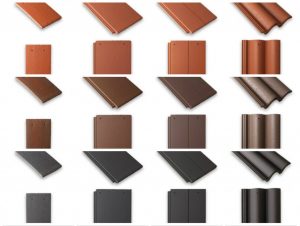2-3 WORKING DAY DELIVERY

Selecting your roof tiles

Offering the homeowner a wide choice of colours, shades and styles, roof tiles can be easier to work with, especially for the novice roofer. The UK is well looked after by companies operating at either end of the price spectrum. Larger companies like Marley, Russell and Sandtoft look after the mass market sector, whilst independent manufacturers like Dreadnought offer a more bespoke and traditional roof tile that is more suitable for prestige properties.
At first, this wide choice can be bewildering for the homeowner – the key differentiations are as follows:
Interlocking Tiles
– Among the cheapest and most convenient ways to cover a pitched roof, some are also suitable for low pitches. These roof tiles are large so you do not need a lot of them to cover a normal-sized roof (just ten tiles is enough to cover one square meter). Interlocking tiles do not always work well on complex roof designs as they can be difficult to cut. Concrete interlocking tiles tend to be fairly chunky and may look cheap, whilst the higher quality thinner clay interlocking tiles can be pricey.
Pantiles
Before interlocking tiles became fashionable, pantiles (tiles with an ‘S-shaped profile) were popular, especially in the east of England. Pantiles work well on almost any type of roof adding a quality and perspective not found with plain or interlocking tiles. Many colours and profiles are available manufactured from either concrete or clay.

interlocking pantiles
Plain Tiles
Plain tiles are a good option for traditional roof designs and are available in many shades and colours, both traditional and modern. It takes approximately 60 plain tiles to cover one square meter of roof, so they can take longer to install than interlocking tiles, but the end result can be very pleasing.

Clay or concrete, handmade, hand-formed or machine-made?
Handmade – A handmade tile is one that is completely made by hand. Desirable especially in period properties or where you are looking for a unique appearance and a warmer, deeper colour or shade.
Machine-made tiles offer the homeowner a very standard and consistent roof cover. Translating into a cheaper price, the downside is that one roof may look like any other.
Handformed tiles are middle-ground choices that offer some of the unique character of a handmade tile but at a cheaper price.
Clay tiles – traditional “Spanish” style clay tiles are the most well-known tiles, but there are many other designs available today. Clay tiles tend to last slightly longer than concrete tiles (40-50 years). Whilst clay tiles are slightly more expensive than concrete, they are warmer in colour and are much less likely to fade as the tiles age,
Concrete tiles – Concrete tiles offer a cost advantage but may not be as durable or colourfast as clay tiles. Cheaper concrete tiles also tend to have the colour ‘painted’ on one side of the tile which is more likely to wear off in time.

You may also like:






Stay Connected With US
Address
Harrison Way, Matlock, Derbyshire, DE4 2LF
Email
sales@ashbrookroofing.co.uk
Phone
01629 732988
Order Online
24/7 hours a day
